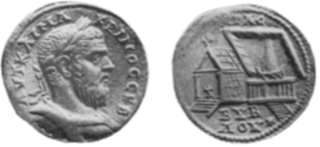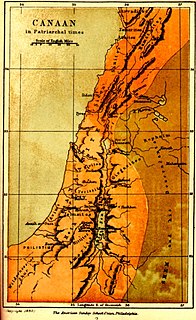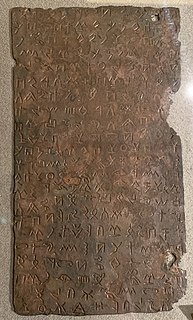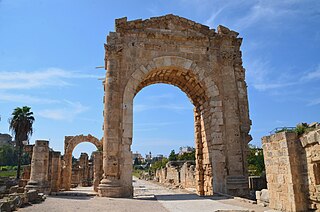Related Research Articles

Carthage was the capital city of the ancient Carthaginian civilization, on the eastern side of the Lake of Tunis in what is now Tunisia. Carthage was one of the most important trading hubs of the Ancient Mediterranean and one of the most affluent cities of the classical world.

ʼĒl is a Northwest Semitic word meaning "god" or "deity", or referring to any one of multiple major ancient Near Eastern deities. A rarer form, ʼila, represents the predicate form in Old Akkadian and in Amorite. The word is derived from the Proto-Semitic *ʔil-, meaning "god".

The Phoenician alphabet is an alphabet known in modern times from the Canaanite and Aramaic inscriptions found across the Mediterranean region.

Byblos is a city in the Keserwan-Jbeil Governorate of Lebanon. It is believed to have been first occupied between 8800 and 7000 BC and continuously inhabited since 5000 BC, making it one of the oldest continuously inhabited cities in the world. It is a UNESCO World Heritage Site.

Philo of Alexandria, also called Philo Judaeus, was a Hellenistic Jewish philosopher who lived in Alexandria, in the Roman province of Egypt.
Eupolemus is the earliest Hellenistic Jewish historian whose work survives only in five fragments in Eusebius of Caesarea's Praeparatio Evangelica, embedded in quotations from the historian Alexander Polyhistor, and in the Stromata of Clement of Alexandria.
Thallus or Thallos perhaps a Samaritan, was an early historian who wrote in Koine Greek. He wrote a three-volume history of the Mediterranean world from before the Trojan War to the 167th Olympiad, 112–108 BC, or perhaps to the 217th Olympiad, AD 89-93. Most of his work, like the vast majority of ancient literature, has been lost, although some of his writings were quoted by Sextus Julius Africanus in his History of the World. It is not known when he lived and wrote, but his work is quoted by Theophilus of Antioch, who died around AD 185 and most scholars date his writings around 50 AD.
Sanchuniathon, also known as Sanchoniatho the Berytian, is the Phoenician author of three lost works originally written in the Phoenician language and surviving only in partial paraphrase and summary of a Greek translation by Philo of Byblos, according to the Christian bishop Eusebius. These few fragments comprise the most extended literary source concerning Phoenician religion in either Greek or Latin: Phoenician sources, along with all of Phoenician literature, were lost with the parchment on which they were written.

Mot was the ancient Canaanite god of death and the Underworld. He was worshipped by the people of Ugarit, by the Phoenicians, and also by the Hebrews of the Old Testament. The main source of information about his role in Canaanite mythology comes from the texts discovered at Ugarit, but he is also mentioned in the surviving fragments of Philo of Byblos's Greek translation of the writings of the Phoenician Sanchuniathon and also in various books of the Old Testament.

Baʽalat Gebal, 'Lady of Byblos', was the goddess of the city of Byblos, Phoenicia in ancient times. She was sometimes known to the Greeks as Baaltis or Atargatis.
Elyon is an epithet of the God of the Israelites in the Hebrew Bible. ʾĒl ʿElyōn is usually rendered in English as "God Most High", and similarly in the Septuagint as ὁ Θεός ὁ ὕψιστος.
Philo of Byblos, also known as Herennius Philon, was an antiquarian writer of grammatical, lexical and historical works in Greek. He is chiefly known for his Phoenician history assembled from the writings of Sanchuniathon.
Sydyk was the name of a deity appearing in a theogeny provided by Roman-era Phoenician writer Philo of Byblos in an account preserved by Eusebius in his Praeparatio evangelica and attributed to the still earlier Sanchuniathon.
Ancient Semitic religion encompasses the polytheistic religions of the Semitic peoples from the ancient Near East and Northeast Africa. Since the term Semitic itself represents a rough category when referring to cultures, as opposed to languages, the definitive bounds of the term "ancient Semitic religion" are only approximate.

Canaanite religion refers to the group of ancient Semitic religions practiced by the Canaanites living in the ancient Levant from at least the early Bronze Age through the first centuries after the birth of christ. Canaanite religion was polytheistic and, in some cases, monolatristic.
Misor was the name of a deity appearing in a theogeny provided by Roman era Phoenician writer Philo of Byblos in an account preserved by Eusebius in Praeparatio Evangelica, and attributed to the still earlier Sanchuniathon. He was one of two children of the deities Amunos and Magos. The other named was Sydyk. It is said that these two were the first to discover the use of salt. The names "Misor" and "Sydyk" mean "Straight" and "Just".

The Byblos script, also known as the Byblos syllabary, Pseudo-hieroglyphic script, Proto-Byblian, Proto-Byblic, or Byblic, is an undeciphered writing system, known from ten inscriptions found in Byblos, a coastal city in Lebanon. The inscriptions are engraved on bronze plates and spatulas, and carved in stone. They were excavated by Maurice Dunand, from 1928 to 1932, and published in 1945 in his monograph Byblia Grammata. The inscriptions are conventionally dated to the second millennium BC, probably between the 18th and 15th centuries BC.
Kothar-wa-Khasis is an Ugaritic god whose name means "Skillful-and-Wise" or "Adroit-and-Perceptive" or "Deft-and-Clever". Another of his names, Hayyan hrs yd means "Deft-with-both-hands" or "of skillful hands. Kothar is smith, craftsman, engineer, architect, and inventor. He is also a soothsayer and magician, creating sacred words and incantations, in part because there is an association in many cultures of metalworking deities with magic. The divine name Ka-sha-lu in texts from Ebla suggests that he was known in Syria as early as the late third millennium BCE.

Ushu was an ancient mainland city that supplied the city of Tyre with water, supplies and burial grounds. Its name was based upon the mythical figure Usoos or Ousoüs, a descendant of Genos and Genea whose children allegedly discovered fire, as recorded by Sanchuniathon (Sankunyaton).

In Greek mythology, Cronus, Cronos, or Kronos was the leader and youngest of the first generation of Titans, the divine descendants of the primordial Gaia and Uranus. He overthrew his father and ruled during the mythological Golden Age, until he was overthrown by his own son Zeus and imprisoned in Tartarus. According to Plato, however, the deities Phorcys, Cronus, and Rhea were the eldest children of Oceanus and Tethys.
References
- Philo of Byblos, The Phoenician History